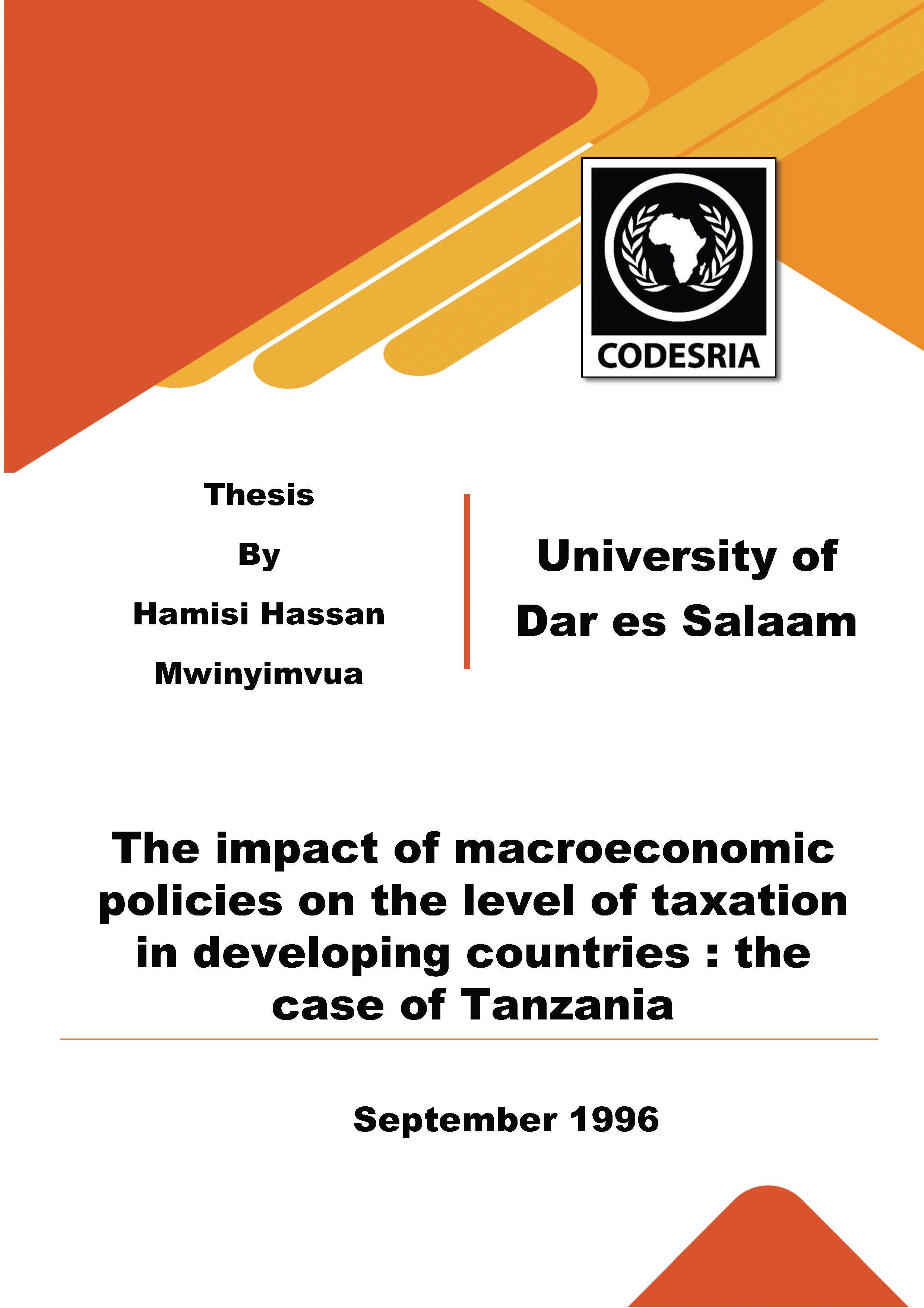The impact of macroeconomic policies on the level of taxation in developing countries: the case of Tanzania
Mots-clés :
macroeconomic, taxation, developing countries, TanzaniaSynopsis
This study investigates the impact of macroeconomic policies on the level of taxation (tax revenue/GDP ratio) in developing countries, with Tanzania as a case study. The study's main hypothesis is that through various channels, macroeconomicpolicies, in particular, the exchange rate, import substitution, trade liberalisation, external debt, interest rate, public sector and wage policies, and inflation, impacted adversely on the level of tax revenue.
Using an Error Correction Model (ECM) and Ordinary Least Squares (OLS) estimation technique, the above hypothesis is tested empirically for the 1967-91 period using Tanzanian data. At the aggregate tax level, empirical results indicate the ).
follpwing: first, macroeconomic policies are an important· determinant of real tax revenue and the level of taxation in Tanzania. Second, the official real exchange rate has a negative impact on the level of taxation. Third, import substitution policies
affect negatively the level of taxation. Fourth, real external debt leads to an increase in the level of taxation. That is, increases in real external debt stock and hence debt service payments induce more tax revenue collection, mainly through tax rate increases. Fifth, the impact of real parastatal profits on the level of taxation is negative. Sixth, the impact of real wage bill on level of taxation is positive, implying that wage bill requirements exert pressure on tax collection by inducing tax rate increases. Seventh, inflation has a negative influence on real tax revenue and level of taxation, mainly because some taxes are collected with delay. Eighth, the impact of real interest rate on the level of taxation is negative. Finally, economic performance as measured by real output change negatively affects the level of taxation. The study also singles out the complexity of the tax structure, tax evasion, and weaknesses in tax administration as other factors behind unsatisfactory tax revenue performance.
Accordingly, based on the above findings, the study recommends for the need to 'rightly' conduct macroeconomic policies to minimise their imbalances and consequently their negative effects on output and tax revenue. It also suggests for the need to simplify the tax structure and strengthen tax administration by increasing enforcement and reducing tax revenue leakage and losses.
Téléchargements
Références
Adam, C.S. (1992), Recent Developments in Econometric Methods: An Application to the Demand for Money in Kenya. AERC Special Paper 15. Centre for the Study of African Economies, University of Oxford, for African Economic Research Consortium, Nairobi.
Adam, C. A. Bigsten, P. Collier, E. Julin and S. O'Connell (1994), Evaluation of the Swedish Co-operation with Tanzania: A Peport for the Secretariat for Analysis of Swedish Development Assistance, Ministry for Foreign Affairs, Stockholm.
Adams, D. W. (1984), "Are the Arguments for Cheap Agricultural Credit Sound?", in D. W. Adams et al., Undermining Rural Development With Cheap Credit, Boulder, Colorado.
Agenor, P.R. (1992), Parallel Currency Markets in Developing Countries: Theory, Evidence, and Policy Implications. Princeton Essays in International Finance (188), Princeton, N .J.
Aghevli, B.B. and M.S. Khan (1978), "Inflationary Finance and the Dynamics oflnflation: Indonesia, 1951-1972". The American Economic Review, Vol.67, 3.
Alesina, A. and G. Tabellini (1989), "External Debt, Capital Flight and Political Risk". Journal of International Economics, Vol.27.
Ascher, W. (1989), "Risk, Politics and Tax Reform: Lessons from Some Latin American Experiences", in M. Gillis (ed.) (1989), Tax Reform in Developing Countries.
Durnham: Duke Univ. Press.
Bahl, R.W. (1971), "A Regression Approach to Tax Effort and Tax Ratio Analysis". IMF Staff Papers, Vol.18.
Bailey, M. J. (1956), "The Welfare Cost of Inflationary Finance", Journal of Political Economy, Vol. 64.
Banerjee, A., J.J. Dolado, G.W. Galbraith and D.F. Hendry (1992), "Equilibrium, Error Correction and Cointegration in Economics, Oxford University Press.
Bank of Tanzania (BOT) (1983), Tanzania: Twenty Years of Independence, 1961-1981, Dar es Salaam.
Barro, R.J. (1972), "Inflationary Finance and the Welfare Cost of Inflation". Journal of Political Economy, Vol.80.
Bhagwati, J.N. (1982), "Directly Unproductive, Profit Seeking (DUP) Activities". Journal of Political Economy, Vol.90, No.5.






